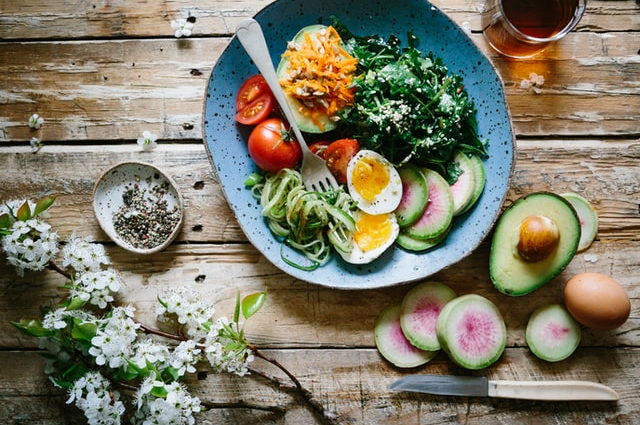
Ayurveda : Diet and Nutrition for Pregnant women
“To be pregnant is to be vitally alive, thoroughly woman, and distressingly inhabited. Soul and spirit are stretched – along with body – making pregnancy a time of transition, growth, and profound beginnings.
Pregnancy is not only about the baby its also about women who grow along with baby mentally and emotionally and that is acknowledged by Ayurveda a beginning of life cherished by care of mother.
Pregnancy is an incredible and beautiful time in any woman’s life. Whether the pregnancy was long-awaited or a complete surprise, but the excitement of preparing to meet a part of our own as a baby is world's best feeling.
For some, pregnancy is an incredible time where a woman feels like she is blooming and beautiful. Others struggle with terrible nausea, discomfort, back pain, and exhaustion, as well as the stresses and strains of attending lots of doctor’s appointments and wanting the very best for their baby.

Image by Dan Evans from Pixabay
Antenatal care is the care of woman during pregnancy and to achieve a goal of healthy baby and healthy mother and our ancient Acharyas describe and emphasized about diet and nutrition of pregnant women under "Masanumasika Garbhini Paricharya”. Balanced and adequate diet is therefore of utmost importance during pregnancy and lactation to meet the increased needs of the mother, and to prevent “Nutritional Stress”. Garbhini Paricharya is the unique and relevant regimen for pregnant ladies. The Ahara (food) consumed by Garbhini (pregnant women) will transform into Rasa Dhatu, which has trifold action to nourish a woman’s body, to help in the formation of Stanya (breast milk), and to nourish the Garbha (fetus).
Main objectives of antenatal care in Ayurveda are:
- To promote, protect and maintain the health of the mother during pregnancy.
- To detect high risk cases and give them special attention.
- To reduce maternal and infant mortality rate and morbidity.
- To teach the mother elements of child care, nutrition, personal hygiene and environmental sanitation.
To protect garbha, adopting garbhini paricharya by pregnant women is much essential because a pregnancy in total duration consumes about 60000kcal over and above normal metabolic requirements. On an average, normal healthy woman gains 12kg of weight during pregnancy, but weight gain of poor Indian women averaged 6.5kg during pregnancy, therefore there is a tremendous role of masanumasika aahara krama labha (month wise dietary regimen for Pregnant women and its effect) with reference to garbhini chinha (signs and symptoms of pregnant women).
The pregnancy diet should be light, nutritious, easily digestible and rich proteins, minerals and Vitamins. The diet should consist in addition to the, principal food at least half litre of milk (1litre milk contains 1 gm of calcium), plenty of green vegetables and fruits. The amount of salt should be of sufficient amount to make the food tasty. Atleast half of the total proteins should be of animal type containing all amino acids , vitamin A and D.
The diet plan should be for individual women as ayurvedic principles has lots of attention to individual body and soul. The specific diet and lifestyle guidelines to follow during the nine months. Eat food that is mild, easy to digest and maintain regular meal timings. It is better to avoid spicy foods, sexual intercourse, heavy exercises, and negative feelings.
First Month:
Sweet cold liquid diet avoid massages, Sweet food aids in formation and growth of cells and helps stabilize Vata. Dates, ripe bananas, and grapes are also some of the stabilizing foods which are easily digestible, loaded with nutrients, and are excellent immunomodulators. Consume a spoonful of water chestnut powder daily with milk and ghee (stabalise fetus)
Second Month:
Have milk mixed with cardamom ,almond or shatavari
Third Month:
Have the same regime, but now mix them with milk, honey and ghee.
Fourth Month:
Consume good quantities of food at breakfast and lunch. Include healthy fat in your diet as the fetus develops the body tissues in this month. Rice can be combined with milk and ghee, or with yogurt.
Adding 10 grams butter to your rice and milk gruel will provide you with the fat content and the essential nutrients like protein, vitamins, foliate, and minerals like calcium, potassium, and magnesium. Potassium is important for muscle activity and uterine contractions while protein is required for muscle development. Fruits like mango, watermelon, white pumpkin, yellow pumpkin, and pomegranate should be consumed.
Fifth Month:
Continue the supplement regime of the fourth month. Oil application and gentle massage followed by a bath with lukewarm water is recommended. Continue this till delivery.
Sixth Month:
Cow’s milk and ghee should be consumed in judicious quantity. Rice gruel or ghee medicated with gokhshur is recommended.
Seventh Month:
Mothers-to-be may feel an itchy sensation on the breast and abdomen or a burning sensation in chest or throat due to increased size of fetus.
Eat food in smaller quantities, frequently, and a bite of sweet something with a little ghee or oil that is easy to digest. Ensure that your salt intake during this period is reduced to a minimum. Also, avoid drinking water immediately after a meal.
Eighth Month:
Eat rice prepared with milk in semi-solid or liquid form with ghee.
Ninth Month:
Follow the same diet as in the eighth month. Meat soup with cooked rice gruel with ghee.
Include a variety of foods such as:
- Cereals including rice, wheat and millets.
- Cooked pulses.
- Leafy greens like spinach, fenugreek, mint and amaranth.
- Roots like sweet potato, garlic, ginger, onion and turmeric.
- Dried fruits like apricot, resins, figs, almonds, dried dates.
- Spices like cardamom, cloves, nutmeg, black pepper.
- Fresh seasonal fruits like pomegranate, dates, banana, apple, oranges, lime, avocados.
- Variety of milk products.
- Substitute refined sugar with jaggery and prefer rock salt over refined table salt.
Things to avoid:
- Fasting and overeating.
- Staying up late at night and sleeping during the day time.
- Long hours of travelling in a vehicle or an aircraft, or on rough roads.
- Dry, heavy, fermented, intense or hot food, alcohol and smoking.
- Avoid lifting heavy things as it will strain your back and abdomen.
- Listening or watching things that give rise to feelings of anger, agony, sorrow or horror.
- Sitting for a long time on hard surfaces in uncomfortable positions
DIET PLAN DURING PREGNANCY It is not an absolute recommendation but simply a guide. It may vary from individual to individual. Along with the diet pregnant women should practice Breathing exercises ,drink plenty of Water or coconut water, do meditation ,stay positive and happy.

Diet Chart
- 7 AM: Milk cup of [pref flavoured almond ,cardamom] 4 almonds soaked, 2 dates.
- 9 AM: Omlette or scrambled or boiled egg/1 bowl of curd (dahi) with paratha/bread /poha /upma /sandwich/dalia /oat/paneer.
- 11 AM: Fruits.
- 12 NOON: Coconut water/chaaj or buttermilk / lemon juice.
- 1 or 1:30 PM: Vegetable /paneer / chiken/fish curry with bowl of daal (veg) fried with desi ghee ,curd,salads ,1/2 bowl of rice with 2 chapatees.
- 4 PM: A coconut water.
- 5 PM: Green tea with snack.
- 6 PM: Bhuna chana/ dry fruit/ dates.
- 7 PM: Soup.
- 8 PM: Light dinner 2 chapatees with daal & veg curry (lauki, spinach, etc.) or small serving of chicken/ fish, and kheer/ halwa/ dessert small quantity.
- 10 PM: A glass of milk.
Dr . Maria Sheikh
BSc. BAMS, CGO , MBA
